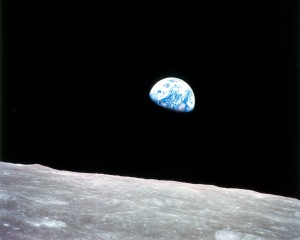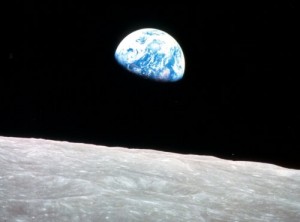
Picture Source: NASA Gallery
http://www.nasa.gov/vision/earth/features/bm_gallery_4.html
Questions:
-What are the sizes of the moon and Earth in the context of space?
The mass of an object explains how much matter it contains, and the volume of an object explains how much space that mass occupies. Scientists generally write the measurements of massive objects like the Earth and moon in scientific notation to condense the account of this information. The mass of the moon is 7.3477 x 1022 kg, and it’s volume is 2.197 x 1010 km3. By comparison, the Earth’s mass is 5.9722 x 1024 kg and it’s volume is 1.08321 x 1012 km3. This makes the mass of the moon “only 1.2% the mass of the Earth” (Cain) and the volume of the moon “only 2% the volume of the Earth” (Cain). It’s difficult for most people to interpret these massive quantities so scientists sometimes suggest metaphors that can relate the information for general human understanding. For example, if the dimensions of the Earth were the size of a nickel’s face, the size of the moon would be the size of a small green pea.
-How do the Earth and moon travel through space?
Scientists theorize all matter existing today is the result of the Big Bang, an explosion taking place 13.7 billion years ago. The four forces that scientists can demonstrate governing the universe, the strong and weak nuclear forces, electromagnetism, and gravity, transformed this matter as it was flung through space. Over time, most of this matter coalesced to build complex celestial bodies, like the Sun, the Earth, and the Moon, which are still in motion as a result of their functions through spacetime. The sun’s gravity anchors the Earth’s orbit, and the Earth’s gravity anchors the moon’s orbit. The size of the Earth’s orbit around the sun is about 1.4959826 x 108 km, or 1 Astronomical Unit. (A standard scientists use to measure inter-solar objects.) The size of the moon’s orbit around the Earth is 3.84400 x 105 km, or 0.00257 Astronomical Units.
-How does Earth naturally maintain life?
The planet Earth is the only planet in the universe known by humans to produce and sustain life. The variety of species on Earth ranges in the trillions and through natural selection is constantly changing and evolving. Many different people throughout history have speculated on the origin and meaning of life, and through philosophy, religion, and science have tried to answer many questions about existence. Biology is the field of study concerned with understanding life as we can identify and understand it. Though scientists have many hypotheses about how life began on this planet, the most common theory today is known as panspermia, a process in which the ingredients for life are fossilized in an asteroid and then deposited elsewhere as the rock is manipulated by gravity, in this case, depositing the fossilized ingredients on Earth. Certain conditions on this planet are cited for making life possible while, according to modern understanding, making life impossible on other planets. The Earth’s abundance of water and carbon are the most identifiable elements sustaining life, and are fundamental to the development of every species on the planet. Next, is the Earth’s distance from the sun, which scientists believe regulates the planet with the light and temperatures perfect for carbon-based life forms with our protein systems. The final factor is gravity. Because life on this planet has evolved here for billions of years, all of the life existing today has certain ways of working with the force of gravity. Even at various pressures below ground or underwater, lifeforms have adapted to coexist within their environment. Humans, who are just beginning to explore space beyond the Earth’s pull, realize how necessary gravity is to our bodies’ natural functioning.
-What tools have humans developed of exploring space?
The moon has been gazed upon by man and other animals of Earth for eons. It has been the subject of particular fascination and wonder by humans, whose sapience has bloomed within them a bizarre curiosity, along with a propensity for fashioning reality in their image, through technology and the general drive to leave a mark on everything they encounter. For thousands of years, man has dreamed of exploring space, and ultimately, the moon. Humans have explored space since birth through perception, language and the development of tools to prod and bend the elements to their will. In fact, even many radio waves on Earth now carry human information, in the form of angry commentators bashing local organizers or young men and women carrying tunes to the accompaniment of tone forming instruments being manipulated to produce mathematically harmonic sounds (usually). As the technology of humanity develops, older machines and systems are abandoned in favor of the next generation’s potential and development. The old tools are usually abandoned in the form of some non-recyclable garbage swept into the Earth’s crust, oceans, or atmosphere. To date, six manned missions to the moon have been accomplished, but the cost of these excursions is great and there are no planned missions to the moon in humanity’s future. Humans on the moon have to wear thick, insulated suits to maintain their oxygen and temperature dependencies, along with performing rigorous exercises to maintain the muscles that deteriorate without the stresses of Earth-based gravity. There are no planets or satellites within humanity’s foreseeable technological future that could house life in a way that is physically or economically relevant. Not only are there many struggles on Earth that need to be overcome in the future, but the gravitational and atmospheric forces and pressures throughout space disincline human activity anywhere but on their home planet.
-How have astronauts experienced the moon?
Between the six Apollo missions that landed astronauts on the moon, twelve of them walked the surface. The first man, Neil Armstrong, is known all over the world for making the famous first steps across the moon’s surface. Being on the moon gives astronauts a new perspective of Earth. For decades, satellites have been capturing images of the Earth and transmitting them back to surface, but only twelve men have been fortunate enough to really see the Earth from 384,400 kilometers away. The perspective is incredible and life-changing. Astronauts returning to Earth often report some form of concern or shame for our species, upon viewing this beautiful, fragile, “blue marble” floating in space. When they re-engage with their families, friends, coworkers, and friends many of them pursue humanitarian issues with a sincere sense of urgency, they understand all the conflict, disagreement, and misunderstanding on Earth, but know how young humanity is. They want to help. Edgar Mitchell, an astronaut aboard Apollo 14, returned home to found the Institute for Noetic Sciences, an organization studying consciousness itself. Astronaut Chris Hadfield may have summed it up best when he stated, about humanity, in an interview, “if they could see the whole world every 90 minutes and look down on the places where we do things right, and look down where we’re doing stupid, brutal things to each other and the inevitable patience of the world that houses us — I think everybody would be reinforced in their faith, and maybe readdress the real true tenets of what’s good and what gives them strength.” (Hadfield)
-What factors inspired man’s ascension to space?
-With what symbolism is the moon commonly associated in literature?
-What are the benefits to humanity of exploring space?
—
Sources:
—Earth and Moon Facts and Figures
http://solarsystem.nasa.gov/planets/profile.cfm?Display=Facts&Object=Moon
—Astronaut Experiences Interview
http://abcnews.go.com/Technology/Apollo11MoonLanding/story?id=8124267
—2007 Film: In the Shadow of the Moon
—High Flight Foundation
—Neil Armstrong Final Interview
http://www.theguardian.com/science/2012/aug/25/neil-armstrong-last-interview
—Mass of the Moon, Universe Today, Fraser Cain
http://www.universetoday.com/19728/mass-of-the-moon/
—Volume of the Moon, Universe Today, Fraser Cain
http://www.universetoday.com/20435/volume-of-the-moon/
—Interview: Astronaut Chris Hadfield Brings Lessons from Space Down to Earth, NPR
http://www.npr.org/2013/10/30/241830872/astronaut-chris-hadfield-brings-lessons-from-space-down-to-earth#mainContent


Recent Comments